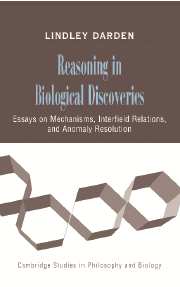 Reasoning in Biological Discoveries
Reasoning in Biological Discoveries Published online by Cambridge University Press: 31 August 2009
INTRODUCTION
This chapter discusses representation of scientific theories and reasoning in theory change. A scientific theory may be represented by a set of concrete exemplary problem solutions. Or, alternatively, a theory may be depicted in an abstract pattern, which when its variables are filled with constants becomes a particular explanation. The exemplars and abstractions may be depicted diagrammatically, as they are in the cases from Mendelian and molecular genetics to be discussed. One way that a theory grows is by adding new types of exemplars to its explanatory repertoire. Model anomalies show the need for a new exemplar; they turn out to be examples of a typical, normal pattern that had not been included in the previous stage of theory development. A special-case anomaly indicates the need for a new exemplar or abstraction, but it has a small scope of applicability. Thus, our subjects here are exemplars, abstractions, diagrammatic representations, and anomalies and the roles they play in the representation of explanatory theories and in the change of such theories. Examples will be taken from Mendelian and molecular genetics.
EXEMPLARS, ABSTRACTIONS, AND DIAGRAMS
Thomas Kuhn (1970, 1974) discussed the importance of “exemplars,” which he characterized as concrete problem solutions in which a formalism is applied and given empirical grounding. Kuhn said that exemplars are taught by the use of problems in textbooks.
To save this book to your Kindle, first ensure [email protected] is added to your Approved Personal Document E-mail List under your Personal Document Settings on the Manage Your Content and Devices page of your Amazon account. Then enter the ‘name’ part of your Kindle email address below. Find out more about saving to your Kindle.
Note you can select to save to either the @free.kindle.com or @kindle.com variations. ‘@free.kindle.com’ emails are free but can only be saved to your device when it is connected to wi-fi. ‘@kindle.com’ emails can be delivered even when you are not connected to wi-fi, but note that service fees apply.
Find out more about the Kindle Personal Document Service.
To save content items to your account, please confirm that you agree to abide by our usage policies. If this is the first time you use this feature, you will be asked to authorise Cambridge Core to connect with your account. Find out more about saving content to Dropbox.
To save content items to your account, please confirm that you agree to abide by our usage policies. If this is the first time you use this feature, you will be asked to authorise Cambridge Core to connect with your account. Find out more about saving content to Google Drive.